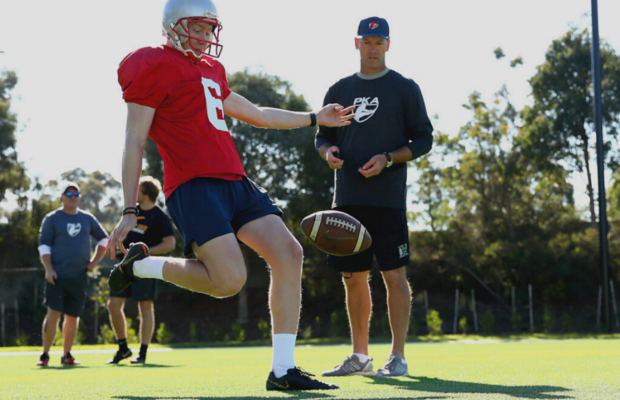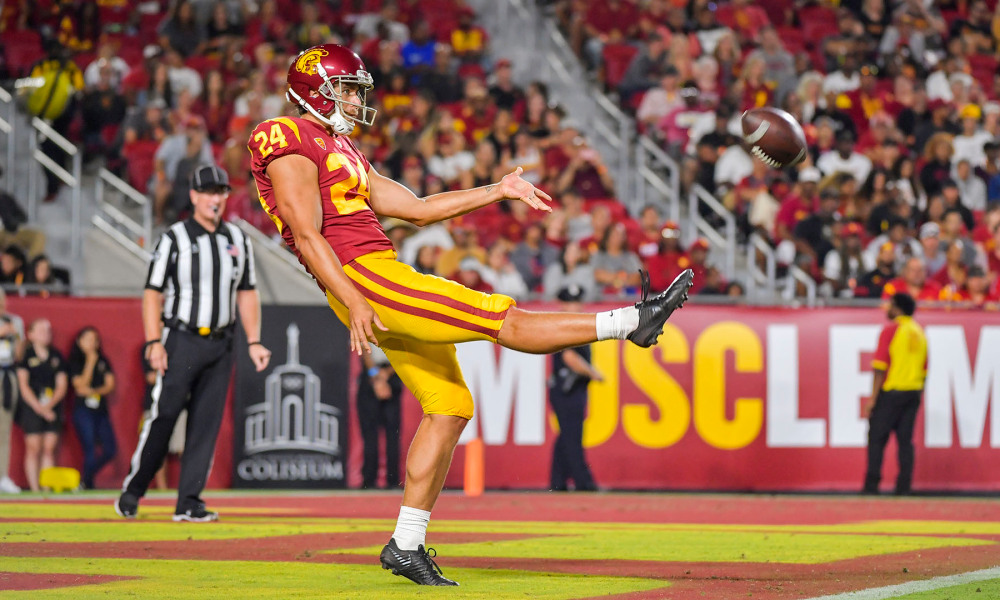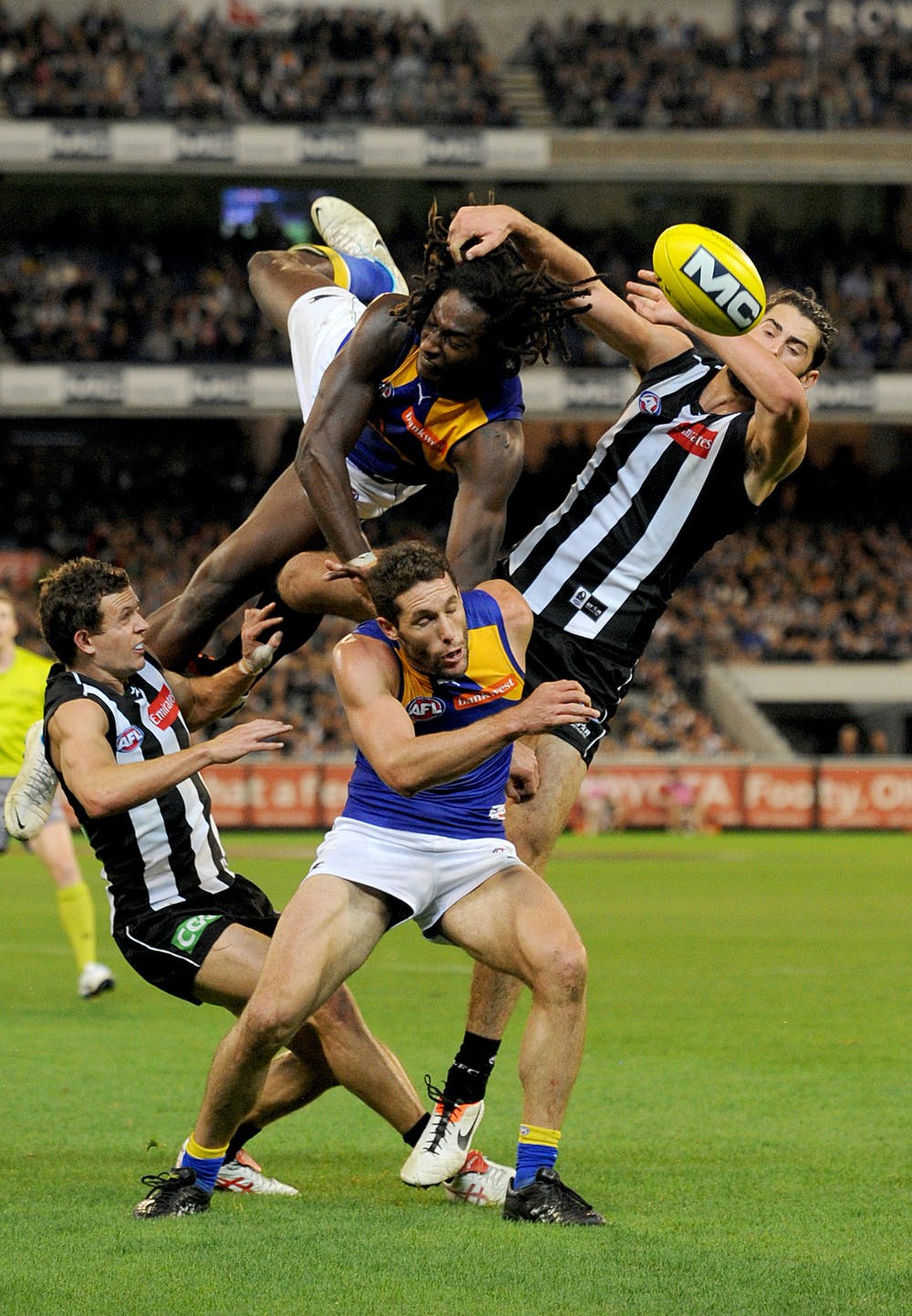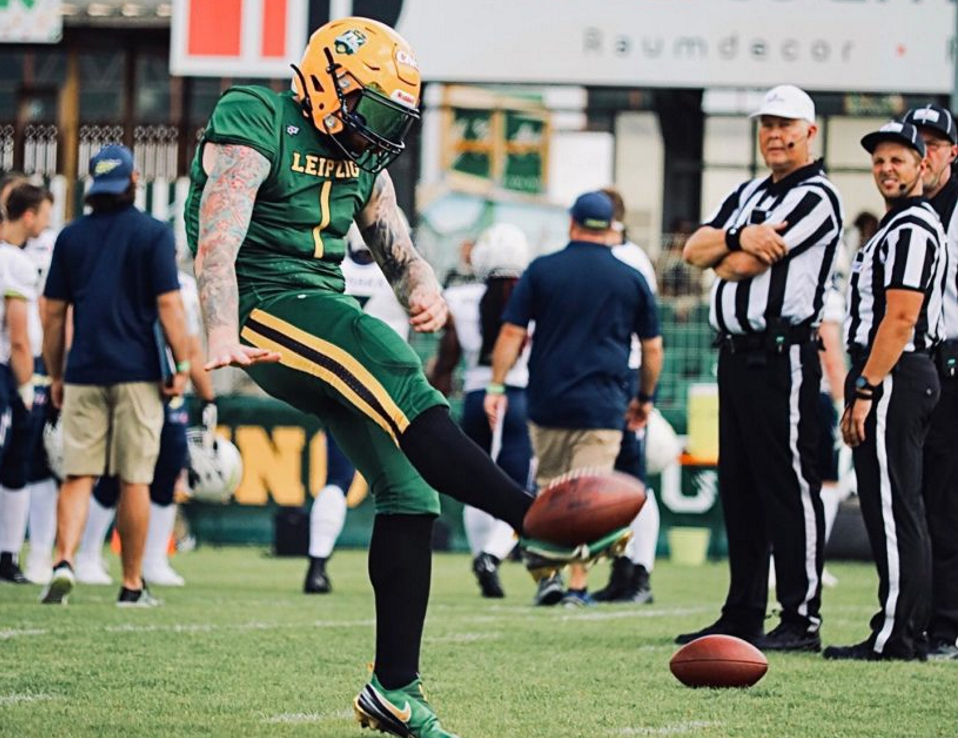College football’s Australian punting invasion

It’s finally September and college football season is now full swing. Spectators may have noticed an international phenomenal taking over Saturday college gamedays on special teams. This year, fourth downs across the nation have featured a staggering rate of Australian punters trotting on the field to help their team tilt field position in their favor.
On fourth downs, the odds of an Australian punter kicking the ball are close to 40% as there are currently 53 punters from down under spread out across rosters on 50 of the 130 FBS teams. The wave of Australian specialists has not been hidden from the prime time spotlight as major college football powerhouses such as Texas, Miami (FL), Ohio State, Auburn, and USC have starting Aussie punters this fall.
Not only has the sheer number of Australian punters garnered attention, but their skills have raised the level of punting across the college football landscape. The 2021 pre-season Ray Guy Award (College football’s best punter) watchlist was unsurprisingly dominated by Australian nationals as 16 of them made the prestigious list. Naturally, the award has gone to an Australian six of the last ten seasons.
The international’s success on college football Saturdays has been well noticed by NFL scouts. Currently, five Australian punters are signed with NFL clubs as of this article.

Australian punter Michael Dickson (4) punts the football against the Philadelphia Eagles at Lincoln Financial Field: Eric Hartline-USA TODAY Sports
So, what makes these Australian athletes so dominant at this niche position in a relatively unknown sport in their homeland? Countries with soccer rich cultures hardly produce kicking talent at this rate. Concurrently, Sumo wrestlers haven’t made a significant impact on NCAA offensive lines. This begs the question what has led to the domination of Australian punters in college football?
For the answer to this question, we went straight to the source asking Aussie punter Jacob Templar. Templar used his own powerful leg to blaze his own path in Europe, staring on fourth downs for the Dresden Monarchs, Hildesheim Invaders, and most recently the Leipzig Kings. Templar credits the sport of Australian rules football as the key to developing easily transferable punting skills.
“I think the thing that makes us train so well at punting is from a young age we’re learning to kick a ball. Not so much in rugby but definitely in Australian football, everyone on the field no matter their shape or size has to be able to not only kick a ball but kickable over 30 to 40 meters and be able to hit someone on the chest with it. So, accuracy and being able to control the height of the ball the velocity, and the direction is something that’s taught from a young age. Similar to pee wee football with the Americans only the major focus is just kicking alone.”

USC punter Ben Griffiths is a former Aussie rules football standout turned NFL prospect punter Photo: USC Athletics
The sport of Australian rules football, often referred to as “footy”, develops other skills that come in handy. Typically these athletes have well-developed American football skills such as tackling, catching, jumping, and running with the ball in the open field. In the imperfect world of special teams, these athletic traits can come in handy.
“We’re all athletes, playing Australian football you have to be able to run you have to be able to tackle, catch, kick and everything else. So, when there’s something such as a low or high snap you have to think on your feet with a rusher coming in fast to block the punt. Generally, Australian punters tend to have a little bit more awareness of what they should do in that situation.”

Australian Rules Football Photo: Joe Castra AAP Image
With raw athletic talent groomed for fourth downs spread out across the large island, the demand for Australian punters has skyrocketed in the United States. Punting academies have popped up across Australia efficiently identifying talented athletes and connecting them with NCAA coaches. No group has been more successful than the Melbourne–based “Prokick Australia”. Directed by former Australian rules football player turned punter Nathan Chapman, the academy has produced five Ray Guy Award winners (best punter in college football award), 17 All Americans, along with four active NFL players and several CFL pros.
Templar commented on Prokick Australia and their keys to success:
“Generally, they train you in a 12-month minimum generally 12-month minimum program as to how to be an athlete on the field as a punter because all these guys are trying to get scholarships their scholarship athletes they need to know how to act they need to know how to perform as a collegiate athlete.”
The NCAA, however, can be a daunting task for any prospect as the eligibility rules, enrolment processes, culture shock, and a host of factors off the field can turn away top international athletes. For the Prokick program, the obstacles are another chance to help the athletes navigate a foreign process with guidance from those who’ve been through it all before:
“It’s always great to have the skill but without the know-how and the contacts and the connection and knowledge as to how all of this thing known as the NCAA works, you can put your foot in it and you can get a lot of things wrong with eligibility going to a school that suits you best. So that’s where Nathan Chapman and the team approach it come in and guide you step by step through you know the eligibility process the enrolment process what expected at college.”
With the man Nathan Chapman at Prokick Australia @ProkickAus @JohnnyPKA 🇦🇺🇺🇸 pic.twitter.com/spCaGT18ry
— Adam Korsak (@AdamKorsak) January 10, 2019
While kicking coaches use their global connections, Australian athletes have played made things easy showing an immense desire to strap up the pads regardless of age. Take former UCLA and Maryland punter 31-year-old Wade Lees, an Australian Football League player turned Prokick Division 1 punter.
Templar explained what makes the NCAA so attractive to Australian talent:
“These Australian football players who have put their entire body on the line for years and years are now being told that they could potentially make the NFL in a few years’ time, make more money than they ever have, or at least at the end of the day if they don’t make the NFL they’re still gonna get an education a degree and is a heck of an experience over in the states going to college just for kicking a ball off 2 steps.”

Former Maryland and UCLA punter Wade Lees came to the states to play college football in his late 20’s after a long career in Aussie Rules Football Photo Credit: LA Times
The perks of the punting positions and the chance at NFL glory can be motivating factors for “footy” players coming from a physically punishing sport with a lower pro payday.
“It gives more benefits for less work so you know we’re always gonna take that up and I think that’s why you’re seeing that massive flow of Australian athletes coming over to college because number one we want to get the shot to go to the next level but also the idea of a free education on top of that is is too good to pass up.”
It seems the trend is here to stay as more and Australian punters make the jump to the states every season. In a copycat football culture, the unmatched success of Australia’s top punters has made college recruiters determined to scoop up the next future Australian pro. Fans can bet the pipeline to down under is firmly in place and will continue to pump in Australian talent to dominate to fourth downs for the foreseeable future.
